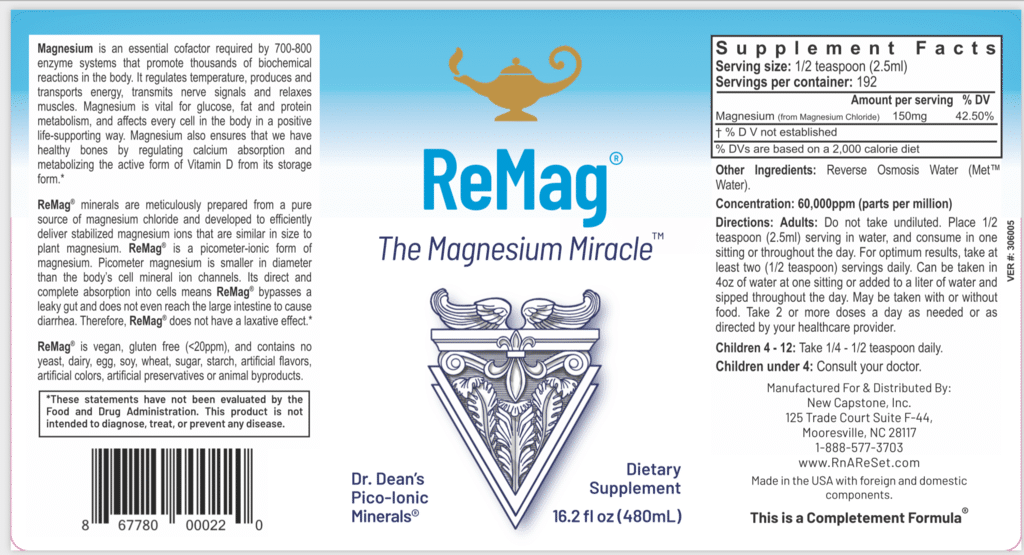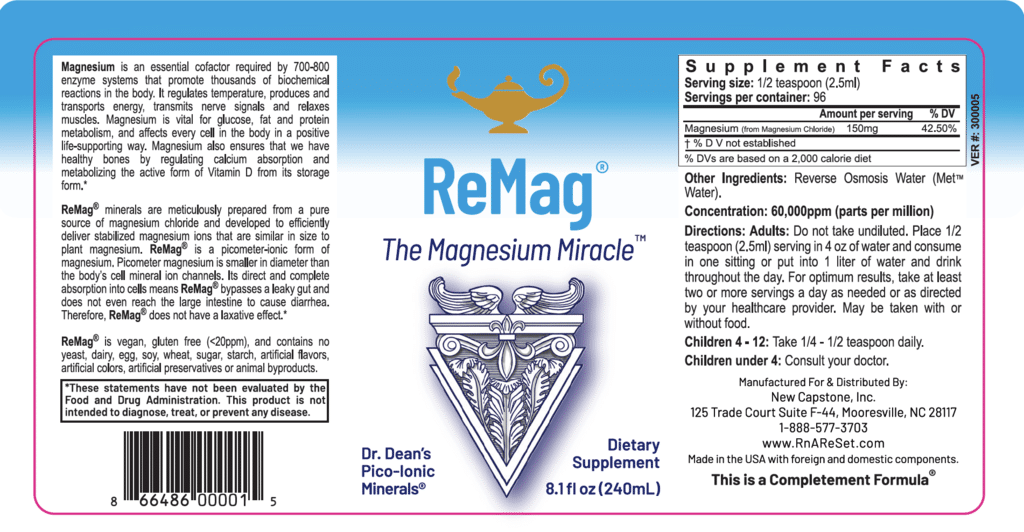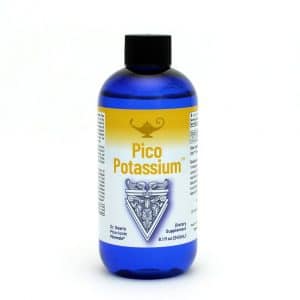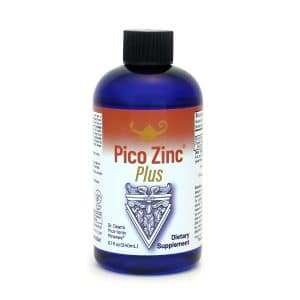Description
Created by Dr. Carolyn Dean (author of The Magnesium Miracle), ReMag™ minerals are meticulously created from a pure source of magnesium chloride and developed to deliver stabilized magnesium ions that are similar in size to plant magnesium. ReMag is a picometer-ionic form of magnesium, smaller in diameter than the body’s cell mineral ion channels. Its direct and complete absorption into cells means ReMag™ bypasses a leaky gut and does not even reach the large intestine to cause diarrhea.
- Activates 700-800 body enzyme systems
- 100% absorbed at the cellular level
- Liquid formula. Strong mineral taste.
ReMag™ is truly The Magnesium Miracle™ as it is an essential cofactor required by 700-800 enzyme systems that promote thousands of biochemical reactors in the body. It regulates temperature, produces and transports energy, transmits nerve signals, and relaxes muscles. Magnesium is vital for glucose, fat, and protein metabolism, and affects every cell in the body in a positive life-supporting way. Magnesium also supports healthy bones by regulating calcium absorption and metabolising the active form of Vitamin D from its storage form.
It’s noteworthy that low potassium can increase urinary magnesium loss. And if your magnesium and potassium are already low, your potassium levels have a harder time improving without additional magnesium.
What to Look For In a Magnesium Supplement
What form of magnesium should you take, and how do you make the best decision for you? There are a staggering number of different magnesium supplements on the market. With so many to choose from, how can you pick one that is going to be the most effective? There are 2 important factors when considering how to select a magnesium supplement:
1. Ingredient Source and Purity
Many magnesium products contain compounds that are not easily absorbed or only provide a small amount of elemental magnesium. Ask for the manufacturer’s certificate of analysis (“COA”) to review for label claims and heavy metal content.
2. Absorption Level
Most magnesium tablets and capsules come in 400mg servings, with the body only able to absorb ~20% of the actual mineral because of how they are made. So, while you think you’re getting 400 mg of magnesium when you’re really only absorbing 80 mg!
There are over 10 types of magnesium that our bodies can utilize, each with a different, scientific name. But all magnesium begins in its pure ionic form, ready to react with other elements or ingredients to become stable. In addition to different additives that take away from its purity, many supplement companies have taken on specialized terms to describe their mixture of magnesium types in attempt to make something new.
Source and Purity of ReMag™
The company that manufactures ReMag™ buys 99.98 – 99.99% pure magnesium ingots. The current source is from San Bernardino Co., California, mined as dolomite. These ingots are broken down into liquid soluble minerals. Thus there are as little as 0.01 – 0.02% impurities in our magnesium chloride. This compares very favourably to high-quality versions of magnesium citrate that are 98% pure, or magnesium chloride from salt lakes that is 96% pure. The key is that 99.98-99.99% pure is just that, 99.98- 99.99% pure, no matter the source.
Ingredients:
Magnesium from Magnesium Chloride, Reverse Osmosis Water (Met™ Water)
Where is Magnesium Stored in the Body?
- 50–60% in the bones
- 20% in skeletal muscles
- 19% in other soft tissues
- less than 1% in the extracellular fluid
Magnesium status within the body is regulated through gastrointestinal absorption, renal excretion, and exchange from magnesium stores in the bones. When magnesium intake is low, the body increases the percent of magnesium absorbed from the diet, decreases the amount excreted through the urine, and pulls magnesium from the bones to make it more available to other tissues throughout the body.
What Blood Tests Are Available to Measure Magnesium Status?
Serum Magnesium
Red Blood Cell (RBC) and Whole Blood Magnesium
Ionized Magnesium Blood Test
What is the Best Way to Determine if You Are Getting Enough Magnesium?
*Please note that this product is subject to currency variations.








